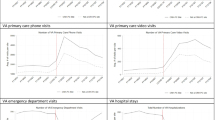Abstract
BACKGROUND
Delivery of comprehensive care for persons with human immunodeficiency virus (HIV) infection in rural and low prevalence settings presents many challenges. We developed and evaluated a telehealth collaborative care (TCC) program for persons with HIV in a rural area.
OBJECTIVE
To determine the feasibility of TCC, and identify factors influencing implementation in rural settings.
DESIGN
Mixed methods evaluation of a quality improvement program with pre-measures and post-measures.
PATIENTS
Veterans with HIV infection in Iowa and Illinois.
INTERVENTION
TCC integrated HIV specialty care delivered by clinical video telehealth, with primary care delivered by generalist providers, in seven Community Based Outpatient Clinics (CBOCs) serving rural areas. Principles guiding TCC design were: 1) clear delineation of specialty and primary care clinic roles in co-managed care; 2) creation of processes to improve care coordination between specialty and primary care teams; and 3) use of a patient registry for population management across sites.
MEASURES
Veterans Affairs (VA) healthcare system performance measures for care for HIV infection and common comorbidities, patient travel time to obtain care, and patient satisfaction. Qualitative evaluation involved semi-structured telephone interviews with patients.
KEY RESULTS
Thirty of 32 eligible patients chose TCC over traveling to the HIV clinic for all care. Among 24 patients in TCC during the June 2011–May 2012 evaluation period, median age was 54 (range, 40–79), most (96 %) were men, and median CD4 count was 707 cells/cm3 (range, 233–1307). VA performance measures were met for > 90 % of TCC patients. Median yearly travel time decreased from 320 min per patient prior to TCC to 170 min during TCC (p < 0.001). Interview themes included: 1) overcoming privacy concerns during care in local primary care clinics; 2) tradeoffs between access, continuity, and care coordination; and 3) the role of specialist involvement in collaborative care.
DISCUSSION
Telehealth Collaborative Care is a feasible approach to providing accessible and comprehensive care for persons with HIV in rural settings.


Similar content being viewed by others
REFERENCES
Handford CD, Tynan AM, Rackal JM, Glazier RH. Setting and organization of care for persons living with HIV/AIDS. Cochrane Database Syst Rev. 2006;3:CD004348.
McInnes K, Landon BE, Malitz FE, et al. Differences in patient and clinic characteristics at CARE Act funded versus non-CARE Act funded HIV clinics. AIDS Care. 2004;16:851–7.
Schur CL, Berk ML, Dunbar JR, Shapiro MF, Cohn SE, Bozzette SA. Where to seek care: An examination of people in rural areas with HIV/AIDS. J Rural Health. 2002;18:337–47.
Ogrinc G, Mooney SE, Estrada C, et al. The SQUIRE (Standards for QUality Improvement Reporting Excellence) guidelines for quality improvement reporting: Explanation and elaboration. Qual Saf Health Care. 2008;17(Suppl 1):i13–32.
Reinert DF, Allen JP. The alcohol use disorders identification test: An update of research findings. Alcohol Clin Exp Res. 2007;31:185–99.
Meader N, Mitchell AJ, Chew-Graham C, et al. Case identification of depression in patients with chronic physical health problems: A diagnostic accuracy meta-analysis of 113 studies. Br J Gen Pract. 2011;61:e808–20.
Backus LI, Boothroyd DB, Phillips BR, et al. National quality forum performance measures for HIV/AIDS care: The Department of Veterans Affairs’ experience. Arch Intern Med. 2010;170:1239–46.
Triant VA. HIV infection and coronary heart disease: an intersection of epidemics. J Infect Dis. 2012;205(Suppl 3):S355–61.
Asch SM, Kilbourne AM, Gifford AL, et al. Underdiagnosis of depression in HIV: Who are we missing? J Gen Intern Med. 2003;18:450–60.
Justice AC, Lasky E, McGinnis KA, et al. Medical disease and alcohol use among veterans with human immunodeficiency infection: A comparison of disease measurement strategies. Med Care. 2006;44:S52–60.
Bernard H, Ryan G. Analyzing qualitative data: Systematic approaches. Thousand Oaks: Sage Publications; 2010.
Arora S, Thornton K, Murata G, et al. Outcomes of treatment for hepatitis C virus infection by primary care providers. N Engl J Med. 2011;364:2199–207.
Katz MH. Human immunodeficiency virus is (once again) a primary care disease. Arch Intern Med. 2011;171:719–20.
McKinnell JA, Willig JH, Westfall AO, et al. Antiretroviral prescribing patterns in treatment-naive patients in the United States. AIDS Patient Care STDS. 2010;24:79–85.
Emanuel EJ. Why accountable care organizations are not 1990s managed care redux. JAMA. 2012;307:2263–4.
Acknowledgments
The work reported here was supported by the Department of Veterans Affairs, Veterans Health Administration, Office of Rural Health, Veterans Rural Health Resource Center—Central Region. The views expressed in this article are those of the authors and do not necessarily represent the views of the Department of Veterans Affairs or the United States government.
Conflict of Interest
The authors declare that they do not have a conflict of interest.
Author information
Authors and Affiliations
Corresponding author
Electronic Supplementary Materials
Below is the link to the electronic supplementary material.
ESM 1
(DOCX 410 kb)
Rights and permissions
About this article
Cite this article
Ohl, M., Dillon, D., Moeckli, J. et al. Mixed-Methods Evaluation of a Telehealth Collaborative Care Program for Persons with HIV Infection in a Rural Setting. J GEN INTERN MED 28, 1165–1173 (2013). https://doi.org/10.1007/s11606-013-2385-5
Received:
Revised:
Accepted:
Published:
Issue Date:
DOI: https://doi.org/10.1007/s11606-013-2385-5



